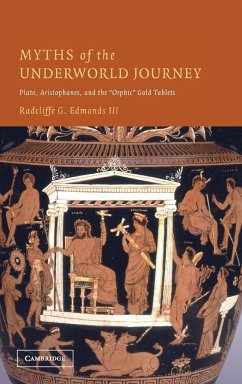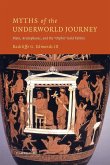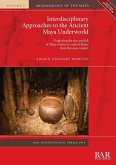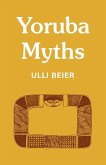Short description/annotation
Explores myths of the underworld in Plato, Aristophanes, and the 'Orphic' gold tablets.
Main description
Plato, Aristophanes, and the creators of the 'Orphic' gold tablets employ the traditional tale of a journey to the realm of the dead to redefine, within the mythic narrative, the boundaries of their societies. Rather than being the relics of a faded ritual tradition or the products of Orphic influence, these myths can only reveal their meanings through a close analysis of the specific ways in which each author makes use of the tradition. For these authors, myth is an agonistic discourse, neither a kind of sacred dogma nor a mere literary diversion, but rather a flexible tool that serves the wide variety of uses to which it is put. The traditional tale of the journey to the Underworld in Greek mythology is neither simple nor single, but each telling reveals a perspective on the cosmos, a reflection of the order of this world through the image of the other.
Table of contents:
1. Introduction: the start of the journey; 2. Roadmaps of déviance: The 'Orphic' gold tablets; 3. Descent into the depths of comedy: The Frogs of Aristophanes; 4. The upward path of philosophy: the myth in Plato's Phaedo; 5. Conclusions: the end of the road.
Hinweis: Dieser Artikel kann nur an eine deutsche Lieferadresse ausgeliefert werden.
Explores myths of the underworld in Plato, Aristophanes, and the 'Orphic' gold tablets.
Main description
Plato, Aristophanes, and the creators of the 'Orphic' gold tablets employ the traditional tale of a journey to the realm of the dead to redefine, within the mythic narrative, the boundaries of their societies. Rather than being the relics of a faded ritual tradition or the products of Orphic influence, these myths can only reveal their meanings through a close analysis of the specific ways in which each author makes use of the tradition. For these authors, myth is an agonistic discourse, neither a kind of sacred dogma nor a mere literary diversion, but rather a flexible tool that serves the wide variety of uses to which it is put. The traditional tale of the journey to the Underworld in Greek mythology is neither simple nor single, but each telling reveals a perspective on the cosmos, a reflection of the order of this world through the image of the other.
Table of contents:
1. Introduction: the start of the journey; 2. Roadmaps of déviance: The 'Orphic' gold tablets; 3. Descent into the depths of comedy: The Frogs of Aristophanes; 4. The upward path of philosophy: the myth in Plato's Phaedo; 5. Conclusions: the end of the road.
Hinweis: Dieser Artikel kann nur an eine deutsche Lieferadresse ausgeliefert werden.








